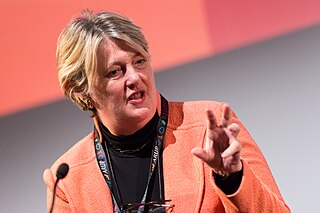
The European Investment Fund (EIF), established in 1994, is a financial institution for the provision of finance to SMEs, headquartered in Luxembourg. It is part of the European Investment Bank Group.

Doughty Hanson & Co is a British private equity fund manager focused on leveraged buyout and recapitalization transactions primarily of upper middle-market companies in Europe. The firm also invests opportunistically in European real estate and provides early-stage venture capital to technology companies.
In the field of finance, private equity (PE) is capital stock in a private company that does not offer stock to the general public. Private equity is offered instead to specialized investment funds and limited partnerships that take an active role in the management and structuring of the companies. In casual usage, "private equity" can refer to these investment firms rather than the companies that they invest in.

Venture capital (VC) is a form of private equity financing provided by firms or funds to startup, early-stage, and emerging companies, that have been deemed to have high growth potential or that have demonstrated high growth in terms of number of employees, annual revenue, scale of operations, etc.. Venture capital firms or funds invest in these early-stage companies in exchange for equity, or an ownership stake. Venture capitalists take on the risk of financing start-ups in the hopes that some of the companies they support will become successful. Because startups face high uncertainty, VC investments have high rates of failure. Start-ups are usually based on an innovative technology or business model and they are often from high technology industries, such as information technology (IT), clean technology or biotechnology.
Seed money, also known as seed funding or seed capital, is a form of securities offering in which an investor puts capital in a startup company in exchange for an equity stake or convertible note stake in the company. The term seed suggests that this is a very early investment, meant to support the business until it can generate cash of its own, or until it is ready for further investments. Seed money options include friends and family funding, seed venture capital funds, angel funding, and crowdfunding.
A private equity fund is a collective investment scheme used for making investments in various equity securities according to one of the investment strategies associated with private equity. Private equity funds are typically limited partnerships with a fixed term of 10 years. At inception, institutional investors make an unfunded commitment to the limited partnership, which is then drawn over the term of the fund. From the investors' point of view, funds can be traditional or asymmetric.
Terra Firma Capital Partners Ltd. (TFCP) is a UK-based private equity firm. Financier Guy Hands founded the firm in 2002 through the spin-off of Nomura Principal Finance Group. The firm, which traces its roots to the formation of its predecessor in 1994, has invested over €14 billion since inception.

Anne Margaret Glover, is CEO and co-founder of Amadeus Capital Partners, a venture capital firm that invests in European high-technology companies. Prior to founding Amadeus in 1997, she was with Apax Partners & Company Ventures, where she was a member of the investment team. She has been a business angel, investing in UK-based information technology start-ups. Glover worked for Virtuality Group plc, where she was COO of the virtual reality peripherals company.

CVC Capital Partners is a Luxembourg-based private equity and investment advisory firm with approximately €186 billion of assets under management and approximately €157 billion in secured commitments since inception across American, European and Asian private equity, secondaries, credit funds and infrastructure. As of 31 December 2021, the funds managed or advised by CVC are invested in more than 100 companies worldwide, employing over 450,000 people in numerous countries. CVC was founded in 1981 and, as of 31 March 2022, has over 850 employees working across its network of 25 offices throughout EMEA, Asia and the Americas.

An equity co-investment is a minority investment, made directly into an operating company, alongside a financial sponsor or other private equity investor, in a leveraged buyout, recapitalization or growth capital transaction. In certain circumstances, venture capital firms may also seek co-investors.

An alternative investment, also known as an alternative asset or alternative investment fund (AIF), is an investment in any asset class excluding capital stocks, bonds, and cash. The term is a relatively loose one and includes tangible assets such as precious metals, collectibles and some financial assets such as real estate, commodities, private equity, distressed securities, hedge funds, exchange funds, carbon credits, venture capital, film production, financial derivatives, cryptocurrencies, non-fungible tokens, and Tax Receivable Agreements. Investments in real estate, forestry and shipping are also often termed "alternative" despite the ancient use of such real assets to enhance and preserve wealth. Alternative investments are to be contrasted with traditional investments.
A private equity firm is an investment management company that provides financial backing and makes investments in the private equity of startup or operating companies through a variety of loosely affiliated investment strategies including leveraged buyout, venture capital, and growth capital. Often described as a financial sponsor, each firm will raise funds that will be invested in accordance with one or more specific investment strategies.
Jeremy Coller is a British businessman and philanthropist. He is the founder, chief investment officer and chairman of Coller Capital.

Coller Capital is one of the largest global investors in the private equity secondary market ("secondaries"). It was founded in 1990 by the UK-based investor and philanthropist Jeremy Coller.

The early history of private equity relates to one of the major periods in the history of private equity and venture capital. Within the broader private equity industry, two distinct sub-industries, leveraged buyouts and venture capital experienced growth along parallel although interrelated tracks.
Impact investing refers to investments "made into companies, organizations, and funds with the intention to generate a measurable, beneficial social or environmental impact alongside a financial return". At its core, impact investing is about an alignment of an investor's beliefs and values with the allocation of capital to address social and/or environmental issues.

ICG Enterprise Trust plc is a large investment company. It is listed on the London Stock Exchange and is a constituent of the FTSE 250 Index. In particular it is one of the largest investment trusts on the stock exchange with a market capitalisation of £820 million as at 27 November 2023.
Angels Den is the Europe's first and largest online investment platform that connects businesses with angel investors. It was founded in 2008 and is authorised by the Financial Conduct Authority (FCA).

ECI Partners is a growth focused private equity group based in the UK and the US, first established by the Bank of England in 1976.
I Squared Capital is a private equity firm focusing on global infrastructure investments. The company invests in energy, utilities, transport and telecom projects in North America, Europe and select high growth economies, such as India and China.










